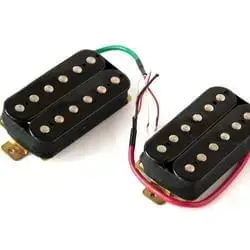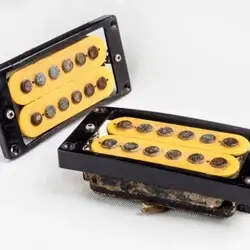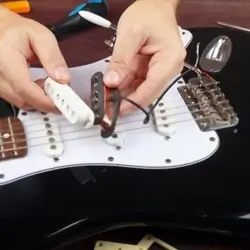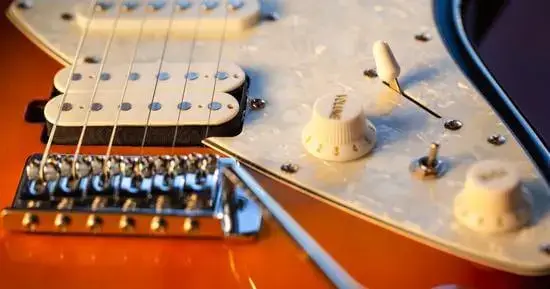If you’re experiencing problems with your guitar pickups, you may want to test them with a multimeter. This guide will teach you how to test guitar pickups with a multimeter. It’s a simple process that can help you diagnose and solve the issue quickly.
A guitar player has to do different experiments over it to make a new tone from it. This experimentation is ok until you damage the pickups of your guitar. The guitar’s pickups are important because all your tones come from it. If the guitar pickups get damaged, you will not get your required tone from the guitar.
Many tiny parts are plugged together in a guitar, making it difficult to approach the right one easily. That might be the reason why people often end up damaging their guitar pickups while practicing. For this, you should know what parts come in the guitar’s pickups and with what type of materials it is made often.
Table of Contents
ToggleComponents of a guitar pickup:
A guitar pickup is made up of
- Set of magnets
- Bar magnet
- Magnetic wires
Set of magnets:
The main part of a guitar pickup is the set of magnets that are placed at regular intervals in the guitar pickup. These magnets act as the core material for the pickup wires, so the set of these guitar pickup magnets is the base of the guitar pickup.
Bar magnet:
A bar magnet is the second important component of the guitar pickup. It is placed under a set of magnets and provides the hold to the set of magnets. In this way, the magnet and the set of other magnets give rise to a magnetic structure.
Magnetic wires:
The set of magnetic wires is wound around the magnetic structure of the guitar pickup. This whole setup helps the guitar pickup produce the magnetic field, which produces the current in the guitar strings, and the sound is produced.
The magnetic wires are made up of copper. These wires have got insulated before wrapping around the magnetic structure.
Reasons why the guitar pickup gets damaged?
A guitar pickup is composed of magnets, and magnetic wires, so physical damage to any part of the guitar pickup can damage it properly.
So before testing the guitar pickup, it is important to know what kinds of issues can occur in a guitar pickup that can damage it badly.
- Magnetic wires get broken down.
- The insulation of the magnetic wire gets damaged
- Any crack in the magnetic wire
- Weakening of the solder joints
- The pickup magnets get corrosive
- The pickup magnets get attracted towards the other magnetic attraction.
Magnetic wires get broken down:
This can be one of the most common reasons for a damaged guitar pickup. As the guitar pickup contains so many magnetic wires wound around the magnetic base, these wires may get weak because, for some reason get broken down.
This will cause the loosening of the guitar pickup structure, and it will not be able to produce enough magnetic fields to get the exact sound from your guitar. In this case, you have to fix this problem by testing it further using a digital multimeter.
Damaged wire insulation:
If the magnetic wire’s insulation gets damaged, you will not be able to take any help from these magnetic wires, and the pickup will get faulty. The insulation can get damaged for many reasons. The quality of the wires can be the prominent one in this matter.
Crack in the magnetic wire:
If the magnetic wire gets cracked, the whole pickup structure will not be able to perform its work, and as a result, it will not be possible for you to produce any sound from your guitar.
Weakening of the solder joints:
Weak solder joints can also damage the guitar’s pickup because if the whole setup is not at its right place and angles, you will not get the sound of the right tone from your guitar, and if it happens, then your guitar is not use-worthy anymore.
Corrosive pickup magnets:
Placing your guitar in a high-level humidity condition can ruin the quality of your pickup magnet by causing corrosion. A corrosive pickup magnet will not provide you with the best results.
Other magnetic interactions:
A guitar pickup can also get damaged because of other magnetic interactions. People often don’t know that if you place any magnet in front of your guitar pickup, then both these magnets will get attracted towards each other, and most likely, the pickup structure of your guitar will get loose and attractive towards the magnetic field of the other magnet and this will cause damage to the guitar pickup.
If your guitar has faced any of the above-explained conditions, it is time to test it using a digital multimeter.
How to test a guitar pickup with a multimeter?
As you are now going to test a guitar pickup with a multimeter, you should know some important materials you must arrange before starting the procedure.
Required material:
- Digital Multimeter
- Screwdriver
- Knife
- Electrical tape
After managing all the material mentioned above, you can test your guitar pickups with a multimeter.
- Turn off the guitar
- Take off the guitar casing
- Turn on the digital multimeter
- Set the digital multimeter on resistance settings.
- Connect the leads of the digital multimeter with the leads of the guitar pickup
- Take the readings
- Compare the results
Here is the below step-by-step guide to test guitar pickups with a multimeter:
Step 1: Turn off the guitar:
Before testing the guitar pickup, it is important to turn off the guitar so that no voltage supply should be given to the guitar pickup. It can be dangerous because you have to touch the wires of the guitar pickup, so if any voltage is present in the guitar, then it can give you an electric shock, so make sure that your guitar is turned off properly before testing the guitar pickup.
Step 2: Take off the guitar casing:
It is important to take off all the guitar casing to easily reach the guitar pickup wires. So for this, you have to take the screwdriver and take off all the tightening bolts from the guitar casing to make pickup access clear to you.
Step 3: Turn on the digital multimeter:
You have to turn on the digital multimeter to start the testing procedure so turn it on on time whenever you start the test. Please do not leave it on for a short time before starting the testing procedure. Doing this can cause an error in the instrument.
Step 4: Set the digital multimeter on resistance settings:
You have to check the resistance of the guitar pickup wires, and you have to set the multimeter on the resistance settings. For this, turn the selection knob of the digital multimeter towards the ohm’s options. After that, manage the range of resistance on it also. You have to set the range to around 20 ohms.
Step 5: Connect the leads:
To test the guitar pickups, you have to make the proper connection between the pickup wires and the multimeter probes, so for this, you have to connect the positive and negative pickup leads to the appropriate multimeter probes.
Make sure that the connecting end of the pickup leads are insulation free so that you will be able to measure the resistance more accurately. If it is not insulation free, you have to use the knife and cut off a little insulation from the wire to make it bear and then join the leads to the multimeter probes.
Step 6: Take the readings:
After connecting the leads to the multimeter, your multimeter will take the readings of the resistance of the pickup wires. You will see the resulting readings on the digital screen of the multimeter.
Step 7: Compare the results:
Note down the resulting resistance readings of your guitar pickup wires.
If you get a very small resulting value, then it means that your guitar pickup is faulty. And if you get the higher resulting readings, then the pickup of your guitar is working normally.
Final verdict
The guitar pickups are considered the top reputed parts of a guitar. People who are master guitar players know very well how to operate the guitar because they know every minute thing about the guitar’s pickups.
That’s why they can produce different tones from it. But if your guitar is causing trouble with the resulting sound and not getting ok even after tuning it, then a damaged pickup can be the reason behind this situation.
Pick the digital multimeter and perform a very simple test on the pickup of your guitar while using this multimeter. Following the information will help you better understand the functionality and the right method to test your guitar pickup using the multimeter.
Related Guides:




